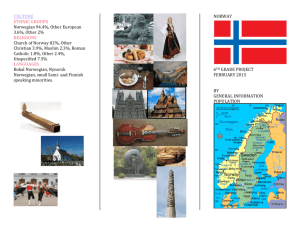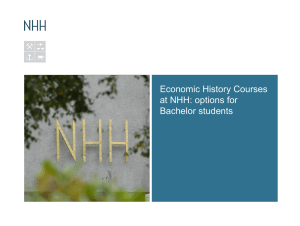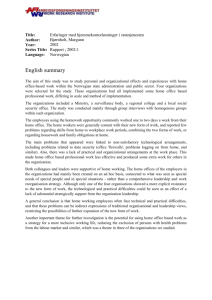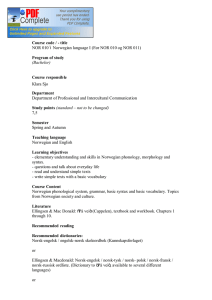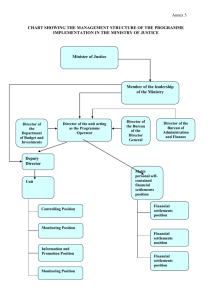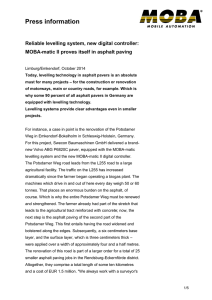Guidelines for access to data and biological samples in the
advertisement
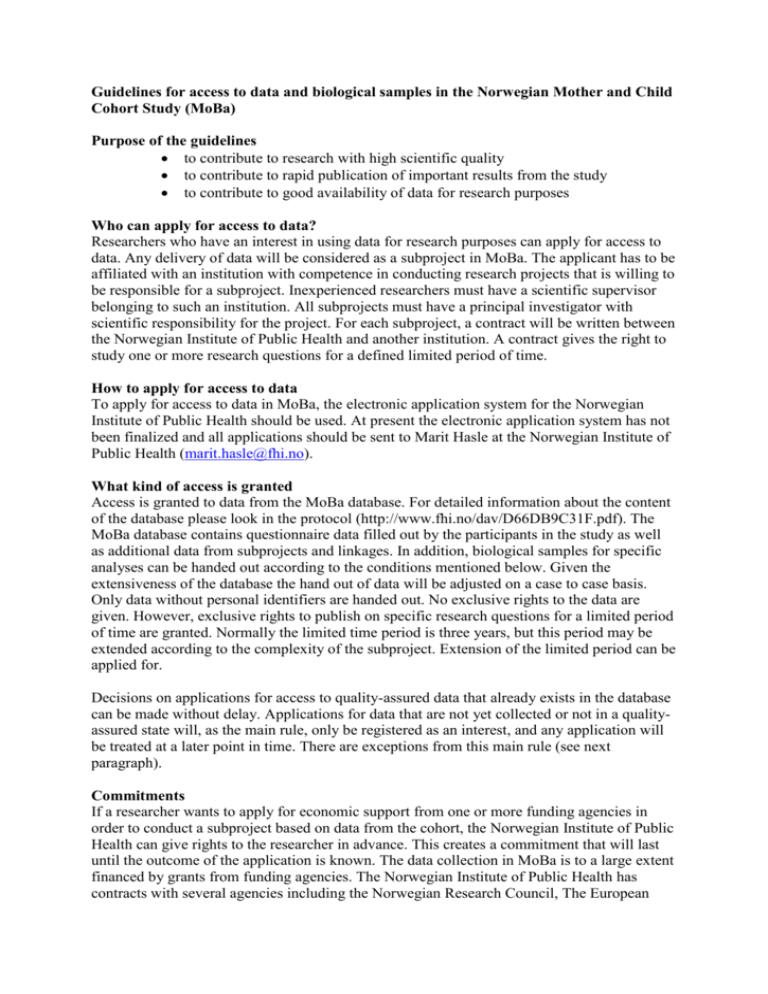
Guidelines for access to data and biological samples in the Norwegian Mother and Child Cohort Study (MoBa) Purpose of the guidelines to contribute to research with high scientific quality to contribute to rapid publication of important results from the study to contribute to good availability of data for research purposes Who can apply for access to data? Researchers who have an interest in using data for research purposes can apply for access to data. Any delivery of data will be considered as a subproject in MoBa. The applicant has to be affiliated with an institution with competence in conducting research projects that is willing to be responsible for a subproject. Inexperienced researchers must have a scientific supervisor belonging to such an institution. All subprojects must have a principal investigator with scientific responsibility for the project. For each subproject, a contract will be written between the Norwegian Institute of Public Health and another institution. A contract gives the right to study one or more research questions for a defined limited period of time. How to apply for access to data To apply for access to data in MoBa, the electronic application system for the Norwegian Institute of Public Health should be used. At present the electronic application system has not been finalized and all applications should be sent to Marit Hasle at the Norwegian Institute of Public Health (marit.hasle@fhi.no). What kind of access is granted Access is granted to data from the MoBa database. For detailed information about the content of the database please look in the protocol (http://www.fhi.no/dav/D66DB9C31F.pdf). The MoBa database contains questionnaire data filled out by the participants in the study as well as additional data from subprojects and linkages. In addition, biological samples for specific analyses can be handed out according to the conditions mentioned below. Given the extensiveness of the database the hand out of data will be adjusted on a case to case basis. Only data without personal identifiers are handed out. No exclusive rights to the data are given. However, exclusive rights to publish on specific research questions for a limited period of time are granted. Normally the limited time period is three years, but this period may be extended according to the complexity of the subproject. Extension of the limited period can be applied for. Decisions on applications for access to quality-assured data that already exists in the database can be made without delay. Applications for data that are not yet collected or not in a qualityassured state will, as the main rule, only be registered as an interest, and any application will be treated at a later point in time. There are exceptions from this main rule (see next paragraph). Commitments If a researcher wants to apply for economic support from one or more funding agencies in order to conduct a subproject based on data from the cohort, the Norwegian Institute of Public Health can give rights to the researcher in advance. This creates a commitment that will last until the outcome of the application is known. The data collection in MoBa is to a large extent financed by grants from funding agencies. The Norwegian Institute of Public Health has contracts with several agencies including the Norwegian Research Council, The European Community and The National Institutes of Health in the United States. These contracts limit the freedom other researchers have to perform research in some specific areas. What should be included in the application? This is thoroughly described in the electronic database. The applicant should specify the institution, responsible person, co-workers, title and purpose, and include a short description of the subproject. This description should be brief and start with the background for the project and the reasons for the choice of research question. Each research question should be formulated in one sentence with individual sentences for sub-questions if necessary. The dataset to be analyzed should be described. The applicant must specify whether additional data are to be collected from the participants or from other sources, and any use of biological material must be specified. The application should also contain a time schedule, a publication plan, and a budget. Considerations to be taken into account when access to data is granted The research question has to lie within the general aims for MoBa according to the protocol. In addition, the following criteria apply: Scientific quality and originality Scientific environment surrounding the applicant Usefulness for preventive or curative medicine Scientific, administrative, practical, and economical contributions to the planning and/or the collection of data in MoBa Additional conditions for access to biological material As opposed to data from questionnaires which can be reused, biological material is a limited resource. In addition to the abovementioned criteria, the following conditions apply: That the project has a research question that cannot be answered by using biological samples from other sources That the results from laboratory analyses should be reused for other scientific purposes The amount of material to be used Documentation from the laboratory that the specified analyses can be conducted with high quality The choice of the number of samples to be analyzed must be accompanied by a statistical power calculation. It is important that there remains sufficient biological material in the biobank until the children in the cohort have reached adulthood. The samples that are handed out will only have laboratory serial numbers to enable results of analysis and left-over material to be tracked and relocated. When the results of the laboratory analyses have been returned to MoBa, the results, together with other relevant variables (e.g. case/control status), will be sent to the researcher as anonymous files. The data from the laboratory analyses will be available for other researchers 3 years after the results have been sent to the primary researcher Who decides? The applications are received and controlled by the staff of the Norwegian Institute of Public Health as part of the continuous management of MoBa. The scientific judgment is provided by an advisory committee of four epidemiologists. The committee is appointed by the Director of the Norwegian Institute of Public Health. Two members are from Norwegian Institute of Public Health. The two others represent the Universities of Norway and the Regional Health Authorities of Norway. In specific cases, outside experts can be consulted. The decision to accept or reject a proposal for a subproject is taken by the Norwegian Institute of Public Health. What happens if more than one researcher is interested in the same research question? In situations where more than one researcher is interested in the same research question, the researchers will be encouraged to collaborate, either on analysis and publication or by dividing the area of interest between each other. In cases where these solutions are difficult, the application that meets most of the conditions mentioned above will be chosen. As part of the coordination process, open scientific meetings around research questions of general interest will be held. These meetings are to be announced broadly. Applicants from abroad Applicants working at research institutions abroad must have one or more Norwegian coworkers, and show that the subproject will contribute to scientific development in Norwegian research groups. Formal permissions If analyses of biological material are to be performed, the applicant, in cooperation with Norwegian Institute of Public Health, must seek the necessary formal permissions from the Data Inspectorate. In cases where an applicant wants to link data from the MoBa database to another registry or dataset, a concession from the Data Inspectorate is required, sometimes with an exemption from the rule of professional secrecy from the Directorate for Health and Social Affairs. If new data are to be collected directly from the participants, either through questionnaires, interviews, clinical assessments, or as biological material, sub-projects should be well grounded and all expenses for the collection of data must be covered by the applicant. Written informed consent must be collected from the participants, and a concession from the Data Inspectorate and a recommendation from one of the Regional Committees for Research Ethics is required. It is important to ensure that the participants are not overwhelmed with new extensive questionnaires or requests for biological samples. Financial conditions As part of the contract, a subproject must pay 100 000 NOK to the Norwegian Institute of Public Health at the time of data delivery. Previous financial and other support will be taken into consideration, implying that this sum can be negotiated. When access to biological material is granted, extra work performed by the staff of the biobank must be covered by the applicant. The expenses for handling samples will be negotiated on a case to case basis. Rules for publication Results from subprojects shall not be mentioned or discussed publicly before they have been published in scientific publications or as abstracts. All manuscripts must be reviewed by the Norwegian Institute of Public Health (please send manuscripts to marit.hasle@fhi.no) before they are submitted for publication. MoBa should be properly mentioned and the presentation of data should be in line with the conditions given. The project will have a 14 days deadline for commenting on drafts for articles. All publications must contain the following sentence: “The data collection was conducted as part of the Norwegian Mother and Child Cohort Study at the Norwegian Institute of Public Health”. All articles also have to refer to an article in the main study describing material and methods. The Norwegian Institute of Public Health is not responsible for the scientific content in articles from external researchers. The content of the contract When the application is approved a contract will be sent to the applicant for their signature. The contract will contain the title of the sub-project, the name of the principal investigator and the institution. The research question and the period of time in which the access has been granted must be referred to. For biological material information about relocation of analysis results must be given. After signatures, a dataset from the database in Bergen will be handed out for subprojects that do not require biological samples. Biological samples will be sent from the biobank in Oslo, and datasets will be sent after the laboratory results have been included in the MoBa database in Bergen.
